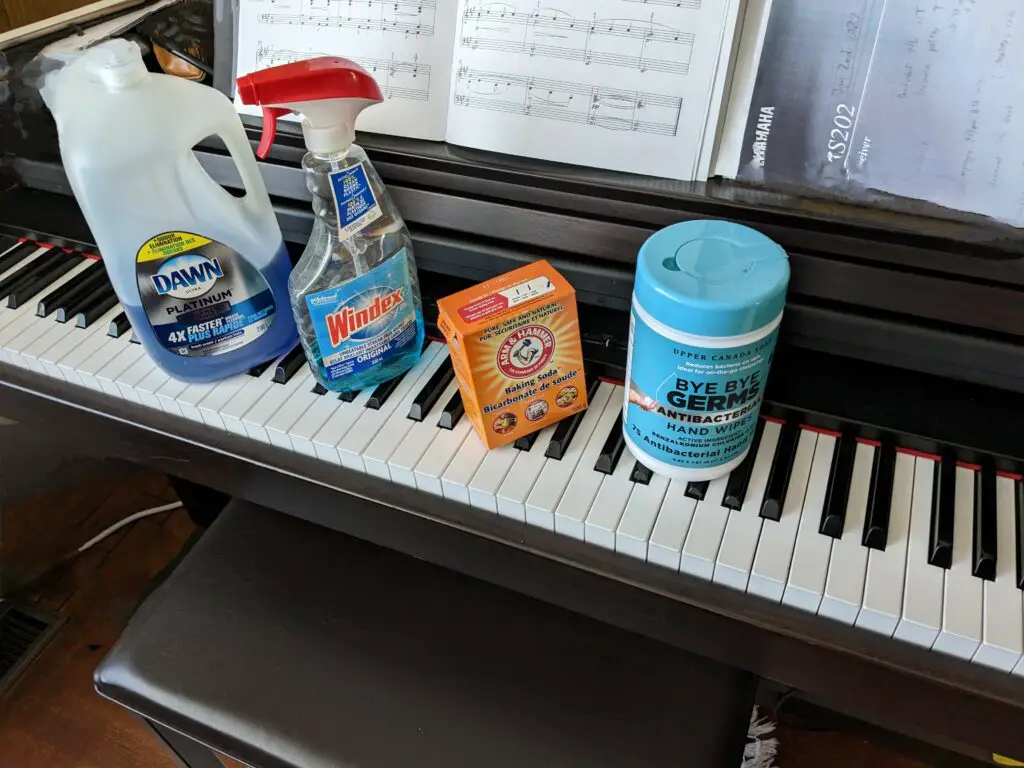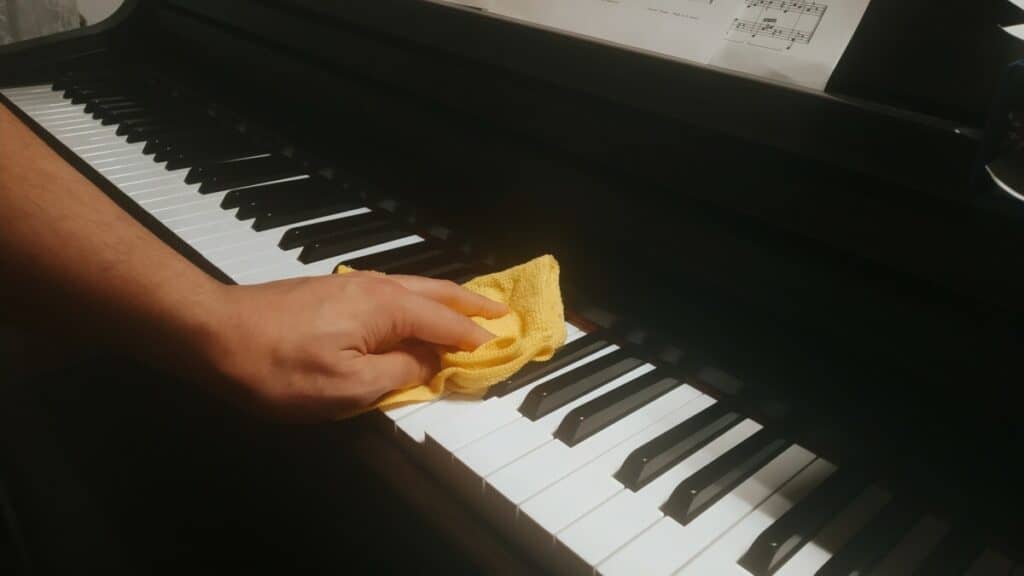This post contains affiliate links.
If you think about it, our fingers and hands may be the dirtiest part of our body. They get sweaty and grimy, and on top of that, we also touch all sorts of things with our hands. Then, we touch our pianos with them.
This means we need to clean our hands and piano keys regularly. However, cleaning piano keys can be tricky since you may want to avoid damaging them. What can you use to clean piano keys?

To clean your piano keys, use a damp soft microfiber cloth. If there are more stubborn stains, you can use dish soap with a soft toothbrush to agitate them. Always allow the keys to dry up before closing the fallboard.
In this article, we explore how you can clean piano keys. We also look at several common questions about what to use to clean piano keys.
Can You Use Windex On Piano Keys?
Generally, using Windex to clean piano keys may not be recommended. This is because Windex’s formulation focuses on cleaning glass.
Piano keys are usually made from plastic, with some older models made from ivory. Windex’s stronger formulation may not be kind to plastics, possibly yellowing them.
Can I Use Rubbing Alcohol On Piano Keys?
It may not be wise to use rubbing alcohol on piano keys. This is because rubbing alcohol is a rather harsh cleaning agent. If you use it, you risk damaging the plastic surface of piano keys.
Rubbing or isopropyl alcohol may draw out the moisture inside the plastic of the piano keys. This may cause the keys to dry out and become brittle and cracked. There may also be discoloration, with your piano keys turning yellowish.
Can I Use Vinegar To Clean Piano Keys?
Generally, vinegar is not a good agent for cleaning piano keys. This is because vinegar is highly acidic and may not react well with plastic. Vinegar may discolor and even damage the piano keys.
Aside from those, vinegar also has a strong, heavy smell. This means the smell may linger around after using them for a day or two. You may not enjoy playing piano with the sour vinegar smell poking at your nostrils.
Can You Use WD40 On A Piano?
It is not a good idea to use WD-40 to lubricate the piano keys if they become stuck. The reason is that WD40 is a petroleum-based liquid formulated to be used on metal. WD40 helps to remove rust and also lubricate moving metal parts.
Piano keys are made of plastic, which means WD40 is not a good fit. In fact, the solvents and chemicals inside WD40 may be too harsh for plastic surfaces. Your piano keys may discolor and become damaged. Not to mention WD-40 may also damage the action underneath the keys.
Can You Use a Magic Eraser On Piano Keys?
You do not want to use Magic Eraser to clean piano keys, although initially, it may look like a good idea. This is because it is a dry cleaner, relying on abrasion instead. That means no excessive moisture that may drip in between the keys.
However, you do not want to use it since it is abrasion-based. Magic Eraser may cause some surface-level damage to your piano keys. It can also cause issues such as scratching. You may also remove some of the clear coatings on the piano keys, causing them to look dull.
Can You Clean Piano Keys With Baby Wipes?
All the cleaning agents above are too harsh. However, it’s ok to use baby wipes on piano keys. This is because if they are soft enough on a baby’s bum, they should be soft enough to be used on a piano key.
However, since baby wipes are designed for skin use, they may not suit piano keys. Chemicals or plant extracts such as aloe vera may react with the white piano keys.
Can I Use Baking Soda To Clean Piano Keys?
You also shouldn’t use baking soda and water solution to clean piano keys. This is because baking soda performs cleaning in an abrasive way, similar to a magic eraser. This means causing surface-level damage to your piano keys.
At the most basic, you risk introducing micro scratches on your piano keys. These micro scratches become ‘valleys’ on your piano keys’ surface and trap oil, dirt, and stains. Nasties trapped inside may also become harder to clean too.
At worst, you may rub away the clear coating on the piano keys, causing them to lose their shine and become dull. The piano keys may also oxidize and turn yellow without a clear coating.
How To Really Clean Piano Keys Safely?
The best way to clean piano keys is to use the most natural cleaner: water. This is because it is PH-neutral, which means it would not be too harsh on the piano keys.
For the exact steps to clean piano keys, you can follow the directions below:
- Start by picking up a soft brush or cloth. Wipe at the keys to remove any dry dust or debris from the piano keys.
- Take a soft microfiber cloth, and dampen it with a small amount of lukewarm water.
- Gently wipe the keys with the cloth. Do not press too hard to prevent too much water from escaping the cloth.
- If you encounter more stubborn stains, add a drip or two of dishwashing liquid. Then slowly agitate with a soft toothbrush to dislodge the stains.
- If you use a dishwashing liquid, wipe the excess soap with a damp cloth.
- Dry the keys with another piece of dry microfiber cloth.
- Allow to air dry for some time before closing the fallboard. This allows any remaining moisture to evaporate away.

You can always get a bottle of piano keys cleaner if you want a more customized solution. You simply spritz the cleaner on the keys and then wipe away with a microfiber cloth.
You also may want to read
Now that you know how to properly clean your piano keys, next is to learn where to put your piano in your house to ensure it’s always in the best condition. Check out this article to avoid having to call a piano technician frequently!

